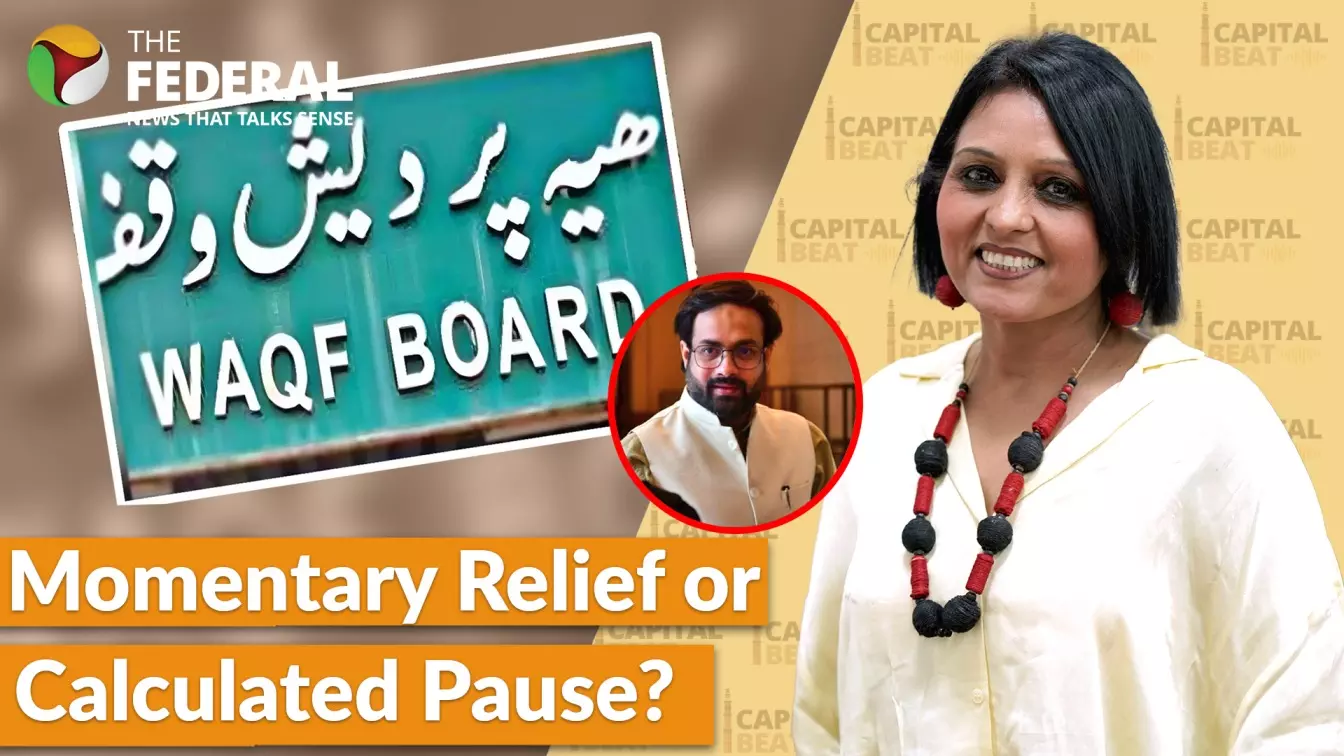
Day 2 of SC hearing on Waqf law
Supreme Court hearing on Waqf law | Day 2 key takeaways
SC records Centre’s assurance: No appointments or waqf property changes till May 5. Relief or tactical pause?

In this episode of Capital Beat, senior journalist Neelu Vyas speaks with lawyer Anas Tanwir to unpack the implications of the Supreme Court's interim stay on certain contentious provisions of the amended Waqf Act. Tanwir, who is closely following the case, shares insights into what the court's directions mean for petitioners, the government, and the future of the Waqf Amendment Act.
Supreme Court intervenes
The Supreme Court has effectively paused key provisions of the amended Waqf Act until May 5. These include the inclusion of non-Muslims on Waqf Boards and Councils and any change to Waqf properties classified as "Waqf by user." Solicitor General Tushar Mehta assured the court that no appointments will be made under the new Act and that the status of existing Waqf properties, including those orally declared, will remain unchanged.
Also read: Waqf properties misused, benefitted land mafia not poor: PM Modi
Tanwir clarifies that while the court did not issue a formal stay, these assurances—recorded in the court's order—are legally binding and provide significant temporary relief. "We are glad that we have got certain reliefs," he says, emphasising that such interim measures are rare in constitutional challenges.
The question of delay
Why didn’t the Supreme Court pass an interim order as suggested the day before? Tanwir speculates that the court wanted a broader, more substantive hearing with documentation and responses from the Union government. Mehta sought seven days to file an affidavit and assured the court there would be no further adjournments.
Tanwir adds that an affidavit carries more legal weight than verbal arguments and that petitioners will also file replies. This sets the stage for a more detailed hearing after May 5.
A partial victory?
Despite some voices calling the Supreme Court’s intervention a victory for petitioners and a setback for the Modi government, Tanwir is cautious. He acknowledges it as a “substantial but partial victory.”
"There’s no harm in calling it a victory," he says. “It is big.” However, he points out that many questions raised by the bench have gone unanswered by the Solicitor General, especially regarding the inclusion of non-Hindus on Hindu temple boards—a parallel drawn during arguments.
On 'Waqf by user'
A major contention is the removal of the “Waqf by user” provision. Senior advocate Kapil Sibal had argued that many Waqf properties, like Delhi's Jama Masjid, were established orally and centuries ago, with no deeds. Asking for documentation now, he said, would be absurd.
Tanwir agrees: "The creation of Waqf is between me and God. The state has no say in it."
He adds that evidence of Waqf lies in usage, not registration, citing the Ram Janmabhoomi verdict where usage was upheld as valid proof.
Legal complexity
Asked whether the latest hearing created confusion, Tanwir responds that such delays are common in constitutional matters. He says the relief—no appointments and no changes to Waqf property—has real consequences, especially since powers granted to district collectors under the amended law have effectively been suspended.
Also read: Waqf Act: Supreme Court proposes to stay key provisions
Yet, Tanwir does acknowledge concerns about relying on assurances, noting past cases where such promises were not upheld. However, he draws a distinction here: "This has been recorded in the order. It’s not just a verbal assurance."
Drafting loopholes
Tanwir critiques the legislative drafting of the Act, calling it confusing and possibly deliberate. "If you can’t dazzle them with brilliance, baffle them with BS," he says, quoting a line he keeps from law school.
Still, he praises Chief Justice Sanjiv Khanna and the more stable functioning of the court in recent months. He expresses confidence that what has been dictated in open court will not be changed in the final order.
Looking ahead to May 5
Tanwir is optimistic about the future of the case but warns against predicting the court's next move. “The only certainty with the court is its unpredictability,” he quips. However, he hopes that the interim relief will be expanded and that ultimately, provisions that violate constitutional rights will be struck down.
One such provision is 3E, which bars the creation of Waqf in Schedule 5 and 6 areas—a clause Tanwir believes is based on the false assumption that there are no Muslim tribals.
Can the Act be struck down?
Tanwir believes the court can strike down the Act entirely if persuaded by strong arguments. He insists there are sound legal grounds for doing so, especially around property rights, religious freedom, and charitable giving. "We’re challenging each and every provision because one flows from the other," he explains.
Hope and legal strategy
Though the final hearing could be years away, the next session on May 5 will focus on interim relief. Tanwir and others are preparing strong responses and remain hopeful. "Some provisions are directly in the teeth of the Constitution. They are simply unconstitutional," he reiterates.
Also read: 'Waqf by user': What does it mean? Why SC raised concerns over it?
The legal battle continues, but for now, the Supreme Court's firm tone and recorded assurances have offered petitioners a breather.
The content above has been generated using a fine-tuned AI model. To ensure accuracy, quality, and editorial integrity, we employ a Human-In-The-Loop (HITL) process. While AI assists in creating the initial draft, our experienced editorial team carefully reviews, edits, and refines the content before publication. At The Federal, we combine the efficiency of AI with the expertise of human editors to deliver reliable and insightful journalism.

